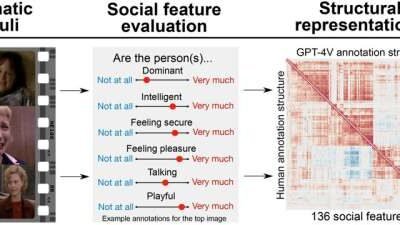AI Research
Study sheds light on hurdles faced in transforming NHS health care with AI

Implementing artificial intelligence (AI) into NHS hospitals is far harder than initially anticipated, with complications around governance, contracts, data collection, harmonization with old IT systems, finding the right AI tools and staff training, finds a major new UK study led by UCL researchers.
Authors of the study, published in eClinicalMedicine, say the findings should provide timely and useful learning for the UK Government, whose recent 10-year NHS plan identifies digital transformation, including AI, as a key platform to improving the service and patient experience.
In 2023, NHS England launched a program to introduce AI to help diagnose chest conditions, including lung cancer, across 66 NHS hospital trusts in England.
The trusts are grouped into 12 imaging diagnostic networks: these hospital networks mean more patients have access to specialist opinions. Key functions of these AI tools included prioritizing critical cases for specialist review and supporting specialists’ decisions by highlighting abnormalities on scans.
The research was conducted by a team from UCL, the Nuffield Trust, and the University of Cambridge, analyzing how procurement and early deployment of the AI tools went. The study is one of the first studies to analyze real-world implementation of AI in health care.
Evidence from previous studies, mostly laboratory-based, suggested that AI might benefit diagnostic services by supporting decisions, improving detection accuracy, reducing errors and easing workforce burdens.
In this UCL-led study, the researchers reviewed how the new diagnostic tools were procured and set up through interviews with hospital staff and AI suppliers, identifying any pitfalls but also any factors that helped smooth the process.
They found that setting up the AI tools took longer than anticipated by the program’s leadership. Contracting took between four and 10 months longer than anticipated and by June 2025, 18 months after contracting was meant to be completed, one-third (23 out of 66) of the hospital trusts were not yet using the tools in clinical practice.
Key challenges included engaging clinical staff with already high workloads in the project, embedding the new technology in aging and varied NHS IT systems across dozens of hospitals and a general lack of understanding, and skepticism, among staff about using AI in health care.
The study also identified important factors which helped embed AI, including national program leadership and local imaging networks sharing resources and expertise, high levels of commitment from hospital staff leading implementation, and dedicated project management.
The researchers concluded that while “AI tools may offer valuable support for diagnostic services, they may not address current health care service pressures as straightforwardly as policymakers may hope” and are recommending that NHS staff are trained in how AI can be used effectively and safely and that dedicated project management is used to implement schemes like this in the future.
First author Dr. Angus Ramsay (UCL Department of Behavioral Science and Health) said, “In July ministers unveiled the Government’s 10-year plan for the NHS, of which a digital transformation is a key platform.
“Our study provides important lessons that should help strengthen future approaches to implementing AI in the NHS.
“We found it took longer to introduce the new AI tools in this program than those leading the program had expected.
“A key problem was that clinical staff were already very busy—finding time to go through the selection process was a challenge, as was supporting integration of AI with local IT systems and obtaining local governance approvals. Services that used dedicated project managers found their support very helpful in implementing changes, but only some services were able to do this.
“Also, a common issue was the novelty of AI, suggesting a need for more guidance and education on AI and its implementation.
“AI tools can offer valuable support for diagnostic services, but they may not address current health care service pressures as simply as policymakers may hope.”
The researchers conducted their evaluation between March and September last year, studying 10 of the participating networks and focusing in depth on six NHS trusts. They interviewed network teams, trust staff and AI suppliers, observed planning, governance and training and analyzed relevant documents.
Some of the imaging networks and many of the hospital trusts within them were new to procuring and working with AI.
The problems involved in setting up the new tools varied—for example, in some cases, those procuring the tools were overwhelmed by a huge amount of very technical information, increasing the likelihood of key details being missed. Consideration should be given to creating a national approved shortlist of potential suppliers to facilitate procurement at local level, the researchers said.
Another problem was initial lack of enthusiasm among some NHS staff for the new technology in this early phase, with some more senior clinical staff raising concerns about the potential impact of AI making decisions without clinical input and on where accountability lay in the event a condition was missed.
The researchers found the training offered to staff did not address these issues sufficiently across the wider workforce—hence their call for early and ongoing training on future projects.
In contrast, however, the study team found the process of procurement was supported by advice from the national team and imaging networks learning from each other.
The researchers also observed high levels of commitment and collaboration between local hospital teams (including clinicians and IT) working with AI supplier teams to progress implementation within hospitals.
Senior author Professor Naomi Fulop (UCL Department of Behavioral Science and Health) said, “In this project, each hospital selected AI tools for different reasons, such as focusing on X-ray or CT scanning, and purposes, such as to prioritize urgent cases for review or to identify potential symptoms.
“The NHS is made up of hundreds of organizations with different clinical requirements and different IT systems and introducing any diagnostic tools that suit multiple hospitals is highly complex. These findings indicate AI might not be the silver bullet some have hoped for but the lessons from this study will help the NHS implement AI tools more effectively.”
While the study has added to the very limited body of evidence on the implementation and use of AI in real-world settings, it focused on procurement and early deployment. The researchers are now studying the use of AI tools following early deployment when they have had a chance to become more embedded.
Further, the researchers did not interview patients and caregivers and are therefore now conducting such interviews to address important gaps in knowledge about patient experiences and perspectives, as well as considerations of equity.
More information:
Procurement and early deployment of artificial intelligence tools for chest diagnostics in NHS services in England: A rapid, mixed method evaluation, eClinicalMedicine (2025). DOI: 10.1016/j.eclinm.2025.103481
Citation:
Study sheds light on hurdles faced in transforming NHS health care with AI (2025, September 10)
retrieved 10 September 2025
from https://medicalxpress.com/news/2025-09-hurdles-nhs-health-ai.html
This document is subject to copyright. Apart from any fair dealing for the purpose of private study or research, no
part may be reproduced without the written permission. The content is provided for information purposes only.
AI Research
AI Transformation in NHS Faces Key Challenges: Study

Implementing artificial intelligence (AI) into NHS hospitals is far harder than initially anticipated, with complications around governance, harmonisation with old IT systems and finding the right AI tools and staff training, finds a major new UK study led by UCL researchers.
The authors of the study, published in The Lancet eClinicalMedicine, say the findings should provide timely and useful learning for the UK Government, whose recent 10-year NHS plan identifies digital transformation, including AI, as a key platform to improving the service and patient experience.
In 2023, NHS England launched a programme to introduce AI to help diagnose chest conditions, including lung cancer, across 66 NHS hospital trusts in England, backed by £21 million in funding. The trusts are grouped into 12 imaging diagnostic networks: these hospital networks mean more patients have access to specialist opinions. Key functions of these AI tools included prioritising critical cases for specialist review and supporting specialists’ decisions by highlighting abnormalities on scans.
Funded by the National Institute for Health and Care Research (NIHR), this research was conducted by a team from UCL, the Nuffield Trust, and the University of Cambridge, analysing how procurement and early deployment of the AI tools went. The study is one of the first studies to analyse real-world implementation of AI in healthcare.
Evidence from previous studies, mostly laboratory-based, suggested that AI might benefit diagnostic services by supporting decisions, improving detection accuracy, reducing errors and easing workforce burdens.
In this UCL-led study, the researchers reviewed how the new diagnostic tools were procured and set up through interviews with hospital staff and AI suppliers, identifying any pitfalls but also any factors that helped smooth the process.
They found that setting up the AI tools took longer than anticipated by the programme’s leadership. Contracting took between four and 10 months longer than anticipated and by June 2025, 18 months after contracting was meant to be completed, a third (23 out of 66) of the hospital trusts were not yet using the tools in clinical practice.
Key challenges included engaging clinical staff with already high workloads in the project, embedding the new technology in ageing and varied NHS IT systems across dozens of hospitals and a general lack of understanding, and scepticism, among staff about using AI in healthcare.
The study also identified important factors which helped embed AI including national programme leadership and local imaging networks sharing resources and expertise, high levels of commitment from hospital staff leading implementation, and dedicated project management.
The researchers concluded that while “AI tools may offer valuable support for diagnostic services, they may not address current healthcare service pressures as straightforwardly as policymakers may hope” and are recommending that NHS staff are trained in how AI can be used effectively and safely and that dedicated project management is used to implement schemes like this in the future.
First author Dr Angus Ramsay (UCL Department of Behavioural Science and Health) said: “In July ministers unveiled the Government’s 10-year plan for the NHS, of which a digital transformation is a key platform.
“Our study provides important lessons that should help strengthen future approaches to implementing AI in the NHS.
“We found it took longer to introduce the new AI tools in this programme than those leading the programme had expected.
“A key problem was that clinical staff were already very busy – finding time to go through the selection process was a challenge, as was supporting integration of AI with local IT systems and obtaining local governance approvals. Services that used dedicated project managers found their support very helpful in implementing changes, but only some services were able to do this.
“Also, a common issue was the novelty of AI, suggesting a need for more guidance and education on AI and its implementation.
“AI tools can offer valuable support for diagnostic services, but they may not address current healthcare service pressures as simply as policymakers may hope.”
The researchers conducted their evaluation between March and September last year, studying 10 of the participating networks and focusing in depth on six NHS trusts. They interviewed network teams, trust staff and AI suppliers, observed planning, governance and training and analysed relevant documents.
Some of the imaging networks and many of the hospital trusts within them were new to procuring and working with AI.
The problems involved in setting up the new tools varied – for example, in some cases those procuring the tools were overwhelmed by a huge amount of very technical information, increasing the likelihood of key details being missed. Consideration should be given to creating a national approved shortlist of potential suppliers to facilitate procurement at local level, the researchers said.
Another problem was initial lack of enthusiasm among some NHS staff for the new technology in this early phase, with some more senior clinical staff raising concerns about the potential impact of AI making decisions without clinical input and on where accountability lay in the event a condition was missed. The researchers found the training offered to staff did not address these issues sufficiently across the wider workforce – hence their call for early and ongoing training on future projects.
In contrast, however, the study team found the process of procurement was supported by advice from the national team and imaging networks learning from each other. The researchers also observed high levels of commitment and collaboration between local hospital teams (including clinicians and IT) working with AI supplier teams to progress implementation within hospitals.
Senior author Professor Naomi Fulop (UCL Department of Behavioural Science and Health) said: “In this project, each hospital selected AI tools for different reasons, such as focusing on X-ray or CT scanning, and purposes, such as to prioritise urgent cases for review or to identify potential symptoms.
“The NHS is made up of hundreds of organisations with different clinical requirements and different IT systems and introducing any diagnostic tools that suit multiple hospitals is highly complex. These findings indicate AI might not be the silver bullet some have hoped for but the lessons from this study will help the NHS implement AI tools more effectively.”
Limitations
While the study has added to the very limited body of evidence on the implementation and use of AI in real-world settings, it focused on procurement and early deployment. The researchers are now studying the use of AI tools following early deployment when they have had a chance to become more embedded. Further, the researchers did not interview patients and carers and are therefore now conducting such interviews to address important gaps in knowledge about patient experiences and perspectives, as well as considerations of equity.
AI Research
one billion euros to reduce costs

Redazione RHC : 11 September 2025 13:59
Volkswagen announced on the first day of the IAA Mobility international trade fair in Munich its intention to integrate artificial intelligence into all areas of its business, with the aim of generating significant cost savings. The investment will focus on the development of AI-based vehicles, industrial applications, and the expansion of high-performance IT infrastructure. According to estimates, the large-scale adoption of artificial intelligence could lead to savings of €4 billion by 2035.
The company expects that the use of AI will significantly accelerate the development of new models and bring advanced technologies to market more quickly. “For us, artificial intelligence is the key to greater speed, quality, and competitiveness along the entire value chain, from vehicle development to production,” said CIO Hauke Stars.
The focus on AI comes at a delicate time for Volkswagen, which is undergoing major transformations in two key markets: China and Germany. In Germany, the group is implementing a large-scale cost-cutting program, while in China it is focusing on innovation and the launch of new models to face growing local and international competition.
Confirming its renewal strategy, the automaker announced the launch of a new line of compact electric vehicles scheduled for next year, with the goal of selling several hundred thousand units in this segment in the medium term. Meanwhile, Volkswagen shares rose 1.3% on Tuesday, up 14.3% since the beginning of the year.
One of the reasons driving Volkswagen to invest in AI is the possibility of optimizing complex processes such as supply chain management and large-scale production. With a global network of suppliers and plants, the company could leverage artificial intelligence to predict logistical disruptions, reduce waste, and improve production planning, thus gaining a competitive advantage in an industry where efficiency and speed are crucial.
Furthermore, the integration of AI represents a strategic step to address future mobility challenges.
AI technologies are, in fact, the basis of autonomous driving, the personalization of services, and the onboard and predictive analytics of vehicle data.
By focusing on these innovations, Volkswagen aims not only to contain costs but also to strengthen its position as a leader in the transition to a smarter, safer, and more sustainable mobility ecosystem.
 Redazione
RedazioneThe editorial team of Red Hot Cyber consists of a group of individuals and anonymous sources who actively collaborate to provide early information and news on cybersecurity and computing in general.
AI Research
Study: AI Agents Shift How Hotels Build Guest Loyalty

The rise of artificial intelligence agents will introduce a new layer of complexity in how the hospitality industry navigates customer loyalty, according to a conceptual paper, “Artificial Intelligence (AI) Agents and the Future of Customer Loyalty,” from four researchers at Florida Atlantic University.
The rise of artificial intelligence agents will introduce a new layer of complexity in how the hospitality industry navigates customer loyalty, according to a conceptual paper, “Artificial Intelligence (AI) Agents and the Future of Customer Loyalty,” from four researchers at Florida Atlantic University.
Before consumer reliance on AI, most hotels used brand awareness, search engine optimization, and other tools to cultivate customer loyalty. As AI agents and autonomous systems increasingly make travel decisions and bookings on behalf of consumers, hotels will need to rethink how they pursue and maintain customer loyalty and the guest experience.
“AI agents will be the new gatekeepers of loyalty,” said Anil Bilgihan, Ph.D., professor of hospitality management in FAU’s College of Business. “The question is no longer just ‘How do we win a customer’s heart?’ but ‘How do we win the trust of the algorithms that are advising them?’ Hotels need to prepare for a future where a guest’s preferred brand may be decided before the guest even opens their phone.”
The paper was published in the International Journal of Contemporary Hospitality Management, with authors Max Ostinelli, Ph.D., assistant professor of marketing; Ye Zhang, Ph.D., associate professor of hospitality and management; Melanie Lorenz, Ph.D., associate professor of marketing; along with Bilgihan.
The shift to AI agents will offload many of the decisions consumers make, instead placing them under the control of autonomous AI agents as they become the primary interface for travel decisions, researchers said. As consumers rely on these agents to search for hotels within their travel preferences, check room availability, pricing trends, review sentiment and make bookings on their behalf, the decision-making process for hotels and travel will come from the algorithm, leading to loyalty to the agent or its ecosystem rather than loyalty to the brand.
“Imagine a traveler asking their AI agent to book a hotel in Miami within a certain budget, with a pool and strong reviews,” Bilgihan said. “The AI is not swayed by traditional advertising; it sorts options based on algorithmic criteria. If your hotel doesn’t surface in that recommendation set, you may never even be considered. This means hotels must design loyalty programs, digital visibility and service experiences that appeal simultaneously to human guests and the AI systems filtering choices on their behalf.”
The paper suggests a framework for hotels and the broader hospitality industry to rethink loyalty strategies as autonomous AI agents become the primary way of engaging and booking travel. While emotional branding still matters for human consumers, marketers must prioritize loyalty programs appealing to both humans and AI systems. Researchers suggest using customer data to tailor experiences while at the hotel, algorithmic visibility, and creating loyalty programs appealing to AI and human users.
“Let’s just take Florida, for example. We welcomed over 34 million visitors this summer alone, and that surge, in combination with technological advances, is rewriting the rules of hospitality,” Lorenz said. “To keep up this trend and stay visible in the future, loyalty must be emotionally resonant, algorithmically relevant, and strategically designed for both human travelers and autonomous agents. AI agents are no longer behind-the-scenes helpers; they’re becoming the architects of guest experience. Hotels that design experiences for both human guests and digital decision-makers will lead the next wave of personalized, predictive hospitality.”
Researchers also warned about potential ethical and privacy concerns in the future, highlighting algorithmic bias as some AI systems may be trained on certain data over others, a lack of understanding on the part of consumers as to how AI agents work and brand visibility challenges.
“At the end of the day, technology doesn’t replace the fundamentals,” Bilgihan said. “No algorithm can cover up for a disappointing stay. AI might shape how guests discover and book, but the foundation of loyalty will always be exceptional customer experience once they arrive. Hotels that combine operational excellence with digital fluency will be best positioned to thrive.”
-FAU-
-

 Business2 weeks ago
Business2 weeks agoThe Guardian view on Trump and the Fed: independence is no substitute for accountability | Editorial
-
Tools & Platforms1 month ago
Building Trust in Military AI Starts with Opening the Black Box – War on the Rocks
-

 Ethics & Policy2 months ago
Ethics & Policy2 months agoSDAIA Supports Saudi Arabia’s Leadership in Shaping Global AI Ethics, Policy, and Research – وكالة الأنباء السعودية
-

 Events & Conferences4 months ago
Events & Conferences4 months agoJourney to 1000 models: Scaling Instagram’s recommendation system
-

 Jobs & Careers2 months ago
Jobs & Careers2 months agoMumbai-based Perplexity Alternative Has 60k+ Users Without Funding
-

 Podcasts & Talks2 months ago
Podcasts & Talks2 months agoHappy 4th of July! 🎆 Made with Veo 3 in Gemini
-

 Education2 months ago
Education2 months agoVEX Robotics launches AI-powered classroom robotics system
-

 Education2 months ago
Education2 months agoMacron says UK and France have duty to tackle illegal migration ‘with humanity, solidarity and firmness’ – UK politics live | Politics
-

 Funding & Business2 months ago
Funding & Business2 months agoKayak and Expedia race to build AI travel agents that turn social posts into itineraries
-

 Podcasts & Talks2 months ago
Podcasts & Talks2 months agoOpenAI 🤝 @teamganassi





















